-

A Comprehensive Guide to IVF
Understanding the Journey of IVF
Embarking on the intricate procedure of in vitro fertilization (IVF) is a moving event that combines the desire for parenthood, hope, and fortitude. IVF is frequently the ray of hope for couples struggling with infertility. This blog post sheds light on the various facets of in vitro fertilization (IVF), exploring the emotional landscape surrounding this reproductive procedure and its technical nuances.
In vitro fertilization is a medical process that makes it possible to conceive a child outside the mother’s body. It entails several laborious procedures, each essential to a successful pregnancy.
Ovulation induction, in which we stimulate the ovaries to create numerous eggs, is the first step in the In Vitro Fertilization Assisted Reproductive Technology method. After that, we open the woman’s ovaries to retrieve the eggs. The eggs are then carefully mixed with sperm in a lab to begin fertilization. We closely observe the resultant embryos in a regulated setting during the embryo culture phase. An embryo is chosen and then placed into the uterus in the hopes of implantation and eventual pregnancy after it is judged viable.
Beyond the technical aspects of the procedure, lifestyle choices significantly impact the outcome of IVF. A balanced diet, frequent exercise to maintain a healthy weight, and giving up unhealthy behaviours like smoking and binge drinking can positively impact fertility.
It is equally vital for people to consider their post-treatment life as they navigate the unpredictable world of in vitro fertilization. While celebrating success in IVF treatment is lovely, the path may also involve overcoming obstacles and considering alternative family-building options. In vitro fertilization is more than just medical treatment; it also involves lifestyle decisions, mental fortitude, and a positive outlook.
It is best to use a professional fertility clinic, where the services of embryologists, fertility nurses, and doctors can help promote a positive outcome. IVF comes with some medical risks, which can complicate the process if not done at a reputable fertility center. Therefore, we must emphasize the importance of visiting quality-driven IVF centers equipped with the latest healthcare equipment and fertility specialists to support you. Call Fruitful Field today at 08129209860, click https://bit.ly/MCHAR or visit us at 2 Omole Layout, Ogunnusi Road, Ojodu.Mother and Child Hospital
-
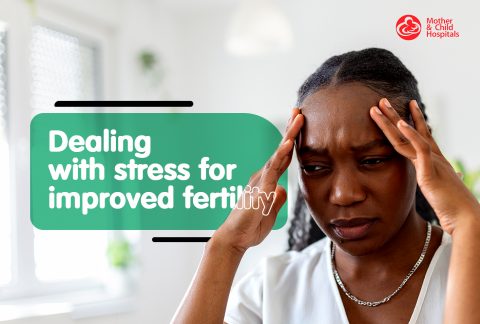
How stress impacts fertility
How stress affects fertility & self-care tips
Stress has become an unavoidable part of everyday life. Stress is how the body responds to changes (pressure) physically, emotionally, and mentally. Stress can be positive (a new job pushing you to stretch yourself) or negative (losing contact with loved ones).
In this blog post, we will explore the connection between stress and fertility and provide strategies for managing mental health to improve your chances of conception.
Understanding the Stress-Fertility Connection:
Stress can push people toward unhealthy habits that affect fertility. Chronic stress can disrupt the hormonal balance necessary for ovulation and sperm production, causing irregular ovulation or reducing sperm count and motility.
Mind-Body Techniques for Stress Reduction:
Practice journaling and meditation to remind yourself of the good things you have going on. Gratitude uplifts your mood. You can also explore yoga and deep breathing exercises as effective stress-reduction methods.
Lifestyle Changes:
A balanced diet, regular exercise, and adequate sleep reduce stress. In contrast, intake of alcohol, caffeine and smoking add to stress and reduce fertility. Explore natural endorphin hormone-boosting activities, like massage and sports, that help you feel good.
Seek Professional Help:
At Fruitful Field, we provide counselling for those going through fertility treatment. We encourage individuals and couples to consult mental health professionals if stress severely affects their fertility journey. Our fertility solutions include IVF treatment through Intracytoplasmic Sperm Injection (ICSI), Intrauterine Insemination (IUI), Semen Freezing, Gender Selection, Cryopreservation (Eggs & Embryos), and Transport IVF.
The Importance of Emotional Support:
When we have good relationships, it supports our emotional health.
Don’t blame your self or your partner for not conceiving or delivering. Instead eliminate mental stress by leaning on your loved ones, and tackling the causes. Communicate regularly with support groups, and stay accountable to your health providers during fertility struggles.
Conclusion:
Stress is a common factor that can negatively impact fertility, but it’s not insurmountable. By adopting stress-reduction techniques, making lifestyle changes, and seeking professional help, individuals and couples can better manage their mental health and increase their chances of conceiving.
To book a consultation with a fertility specialist and take your journey towards success, click here or call +234 812 920 9860.
Mother and Child Hospital
-

Infertility Treatment Options
Infertility Treatment
There are a variety of treatment options available for infertility, depending on the underlying cause. These treatments include:
– Medications: Fertility drugs can help regulate hormones and stimulate ovulation.
– Surgery: In cases where anatomical abnormalities are causing infertility, surgery may be necessary to correct the problem.
Assisted Reproductive Technologies (ART): ART includes procedures such as Intracytoplasmic Sperm Injection (ICSI), in vitro fertilization (IVF), and Intrauterine Insemination (IUI). These procedures involve fertilizing eggs outside the body and transferring them to the uterus.
– Lifestyle Changes: Making certain lifestyle changes, such as reducing alcohol consumption, quitting smoking, and maintaining a healthy weight, can improve fertility.
Conclusion
Infertility affects many couples worldwide. Infertility may be caused by various factors: hormonal imbalances, anatomical abnormalities, or lifestyle factors.It can be an emotionally charged experience. However, there are a variety of treatment options available. If you are dealing with infertility, talk to your doctor or a fertility specialist to discuss your options and develop a treatment plan that is right for you.
Rely on support from loved ones or a mental health professional to help you through the emotional impact of infertility. Infertility is a medical condition, and getting help is a marker of strength, not weakness.
Our fertility specialists at Mother and Child Hospital Fertility Clinic in Lagos, Nigeria, are prepared to help you realize your desire by utilizing the most cutting-edge scientific methods.
We offer a variety of assisted reproductive services, including fertility testing for both individuals and couples, IVF, IUI, ICSI, cryopreservation – egg freezing, embryo freezing, and more.
The Mother and Child Fruitful Field Clinic is dedicated to the effective diagnosis and management of infertility and to the psychological health of couples and individuals experiencing it.
Review our services for more information about assisted reproductive technologies, or contact us for questions on fertility.
Mother and Child Hospital
-
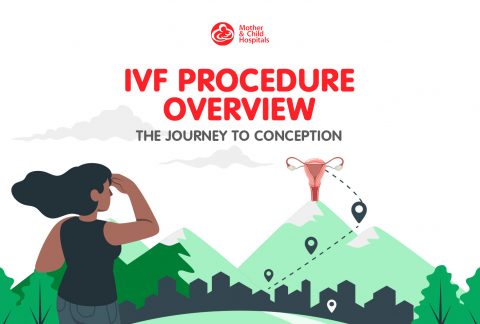
Hope and Joy Through IVF
Infertility Explained
In Vitro Fertilization (IVF) as an assisted reproduction method has brought joy and hope to many couples struggling with infertility.
Here are some of the gains of IVF:
Overcoming infertility: One of the primary joys of IVF is overcoming infertility and fulfilling the dream of having a child. For couples trying to conceive for a long time without success, IVF offers a chance to experience parenthood joys.
Increased chances of conception: IVF significantly increases the chances of conception for couples unsuccessful with other fertility treatments. By combining the sperm and egg in a laboratory setting, IVF bypasses certain fertility barriers. ICSI provides a higher likelihood of successful fertilization.
Genetic screening: IVF often involves preimplantation genetic testing, which allows the screening of embryos for genetic disorders or chromosomal abnormalities. Embryo screening helps identify healthy embryos for transfer, reducing the risk of passing genetic diseases to the child.
Embryo selection: With IVF, fertility specialists stimulate multiple embryos for the woman and select the best quality ones for transfer. Embryo selection gives couples and their healthcare providers more control over the selection process, increasing the chances of a successful pregnancy.
Surrogacy option: IVF can also be combined with gestational surrogacy, allowing couples unable to carry a pregnancy to have a biological child. A gestational surrogate carries the embryo created through IVF, providing a way for intended parents to have a genetic connection with their child.
Emotional support: IVF often involves a comprehensive support system, including medical professionals, counsellors, and support groups. This network can provide emotional support throughout the IVF journey, helping couples navigate the emotional ups and downs and providing reassurance during challenging times.
Building a family: The ultimate joy of IVF is building a family and experiencing the love, joy, and fulfillment that comes with having a child. For many couples, IVF has allowed them to achieve their dream of becoming parents, bringing immense happiness.
It’s important to note that IVF can also be challenging and emotionally taxing, and outcomes may vary for each individual or couple. Having realistic expectations and seeking appropriate medical and emotional support during the IVF journey is essential.
Fruitful Field is the assisted reproduction arm of Mother and Child Hospital that exists to help people have healthy babies through medical interventions. The Fertility Center offers services in Intracytoplasmic Sperm Injection (ICSI), Intrauterine Insemination (IUI), Pre-Implantation Genetic Testing, Transport IVF and more. Click here to register to speak to our consultants or call +2348129209860.
Mother and Child Hospital
-
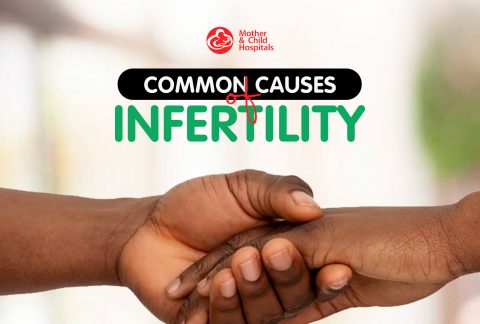
Causes of Infertility
Causes of Infertility
Today, we’re diving into a crucial topic: the common causes of infertility. Infertility can be complex. However, knowledge is power, and understanding what infertility is as well as causative factors can help you navigate your fertility journey with confidence.
Exploring Common Causes of Infertility:
Infertility can be caused by various factors, both in men and women.
1. Age: As we age, fertility naturally declines, with a significant drop after the age of 35. It’s essential to be aware of this factor when planning your family.
2. Medical Conditions: Conditions like polycystic ovary syndrome (PCOS), endometriosis, and hormonal imbalances can affect fertility in women, while issues like low sperm count or motility can affect men.
3. Lifestyle Factors: Smoking, excessive alcohol consumption, stress, and obesity can impact fertility. Making healthy lifestyle choices can significantly improve your chances.
4. Sexual Health: Infections, sexually transmitted diseases (STDs), and certain medications can affect reproductive health. Regular check-ups are crucial.
5. Environmental Factors: Exposure to environmental toxins, such as pesticides or radiation, can harm fertility. Be mindful of your surroundings.
6. Unexplained Infertility: Sometimes, despite thorough testing, the cause of infertility remains unknown. This can be particularly challenging but remember that support is available.
The first step to confirming your fertility status is to conduct a test. For a consultation session with a fertility expert, please call +2348129209860. Visit here to learn more about the Fruitful Field fertility clinic.
Mother and Child Hospital
-
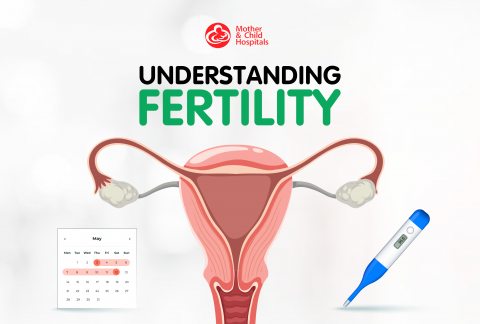
Understanding Infertility
Infertility Explained
What is Infertility?
Infertility affects many couples around the world. It is the inability to conceive after one year of trying for couples under the age of 35 or after six months for couples over the age of 35. Several factors can cause infertility, including hormonal imbalances, anatomical abnormalities, and lifestyle factors. We will examine some infertility causes, its emotional impact, and assisted reproduction treatment options available.
Causes of Infertility
– Hormonal imbalances: Disorders that affect the hormones that regulate reproduction can cause infertility. These disorders include polycystic ovary syndrome (PCOS) and thyroid disorders.
– Anatomical abnormalities: Structural problems with the reproductive system can cause infertility. These problems include blocked fallopian tubes, uterine fibroids, and endometriosis.
– Lifestyle factors: Habits such as smoking, excessive alcohol consumption, and being overweight or underweight affect fertility.
– Age: Women’s fertility decreases as they age because the number and quality of eggs in the ovaries decline.
Emotional effect of Infertility
Infertility can be an emotionally charged experience for couples causing feelings of sadness, frustration, even depression. Many couples also feel a sense of shame or embarrassment about their infertility, which can make it challenging to seek help. The first step to overcoming infertility is understanding the issues, which can be a mix of factors as this post has explained.
Starting a family is beautiful, but it’s not always easy. Mother and Child Hospital Fruitful Field will make that journey smoother with our assisted reproductive services. Our experienced team will provide compassionate care and professional support throughout the process. Let’s work together to make your dreams of growing your family a reality.
To book a consultation with a fertility expert, please call +2348129209860. You can also speak to a Gyneacologist. Please call: +2347036202190 (Omole) or +23470683729787 (Adeniyi Jones). Visit here to learn more about the Fruitful Field fertility clinic.
Mother and Child Hospital
-
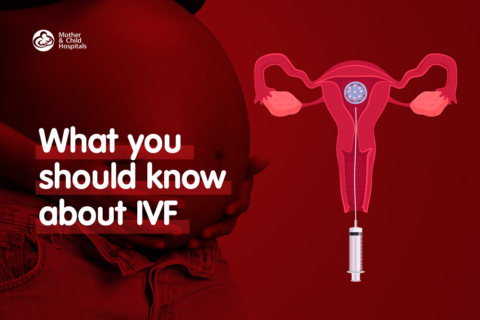
What you should know about IVF
What you should know about IVF
What is IVF?
IVF means In Vitro Fertilization (IVF). It is a form of assisted reproduction in which we retrieve mature eggs from a woman’s ovary, fertilizing them with sperm in a lab and transferring them into a uterus. The stages of IVF are ovulation induction, egg and sperm retrieval, fertilization and embryo transfer. An embryo transfer is the final and most delicate step in the IVF process.
Who can do IVF?
IVF is an infertility treatment. IVF may be recommended for older women trying to conceive because, naturally, their bodies may produce fewer eggs and have difficulty with egg implantation. Egg implantation occurs when a sperm fertilizes an egg and then travels from a woman’s tube to the uterine lining, where it attaches and grows.
IVF is also used to treat certain health conditions in a woman, such as fallopian tube blockage, tubal ligation, Polycystic ovary syndrome (PCOS) causing ovulation irregularities, Endometriosis, and uterine fibroids. For men with low sperm count, poor motility, sperm morphology problems or blockage in the male reproductive tract, a specialist may also recommend IVF.
What are the risks involved?
With IVF, conception is highly likely but not guaranteed. An IVF procedure has significant cost implications, and may have some risks. The fertility center you choose is critical for a higher chance of success and to mitigate risks. A couple that decide to do IVF may experience:
- Multiple babies: Women who go through IVF often conceive twins or triplets. The number of babies is even more in some cases. Using numerous eggs increases the chances that more than one egg will implant, resulting in multiple fetuses.
- Ectopic pregnancy is when the eggs implant outside the uterus instead of inside it.
- Premature delivery and low birth weight: IVF can increase the risk that the mother delivers the baby early and/or that the baby has a low birth weight.
- Miscarriage can occur after IVF at the same rate it may happen in natural conception. One thing to note is that as the mother ages, the rate of miscarriages also increases.
- Complications in the egg-retrieval procedure may result in infection or bleeding.

What determines success?
Your chances of having a healthy baby using IVF depend on many factors. Some of those factors are:
- Age: Women under 35 may have a higher success rate as this is the peak of their fertility. The age factor also applies to a donor. For a man, sperm quality also starts reducing from 35 years.
- Previous pregnancy: A woman has a greater chance of conceiving through IVF if she has been pregnant before and carried her baby to term. On the other hand, a woman who has had recurrent miscarriages may experience challenges conceiving through IVF.
- Infertility Cause: Some medical conditions in a man or woman, including vasectomy, low sperm quality, fibroids, uterine abnormalities, and ovarian dysfunction, may need other treatments, such as surgery or a donor to have a baby through IVF.
- Lifestyle: Smoking by one of the partners significantly reduces the success of conception by IVF. Also, overweight or underweight women have fewer chances of conceiving than people with a normal BMI. Just as proper nutrition is necessary during pregnancy for maternal and child health, people who take adequate nutrition are also more likely to have a successful IVF outcome. The environment one is in also matters, as a healthy environment can influence conception and vice versa.
- The Fertility Clinic: The fertility clinic directly affects the success of an IVF cycle. A good center has the required protocol, technology, laboratory standards, air quality, and experts.
Our IVF clinic at Mother and Child Hospital has a well-equipped lab and seasoned fertility experts to support a successful process. Our experts at Mother and Child Hospital combine care with years of handling infertility, helping couples weigh the options and guiding them in choosing the best course of fertility treatment.
Upon conception, our team of experienced Obstetricians & Gyneacologists, and midwives will attend to you regularly up until birth and after delivery.
The IVF clinic at Mother and Child Hospital runs on Monday, Tuesday, Thursday and Friday from 9 am to 2 pm. Our lab is also running. Please email fruitfulfield@motherandchildhospital.com or call +234 812 9209860 to schedule an appointment.
Mother and Child Hospital
Healthy Family, our Mission | Contact us on +2347036202190 or +2347068372987
